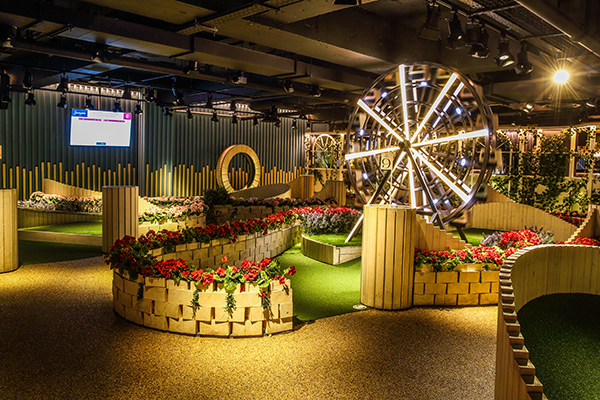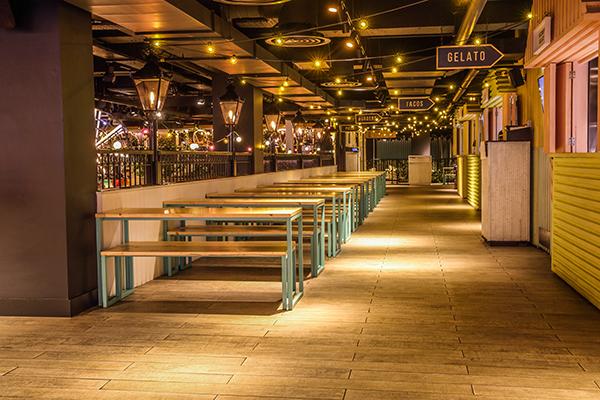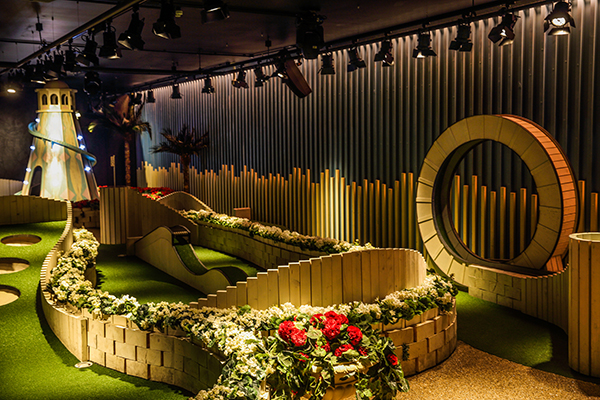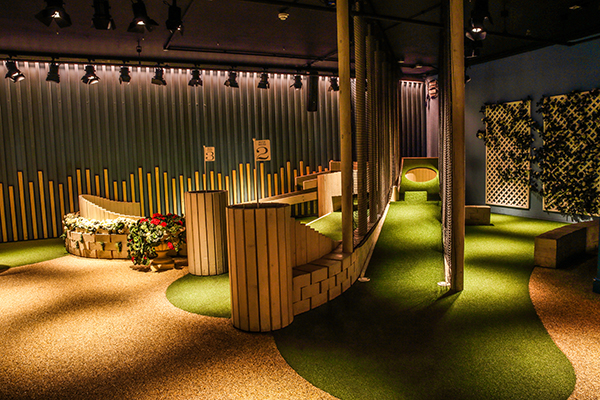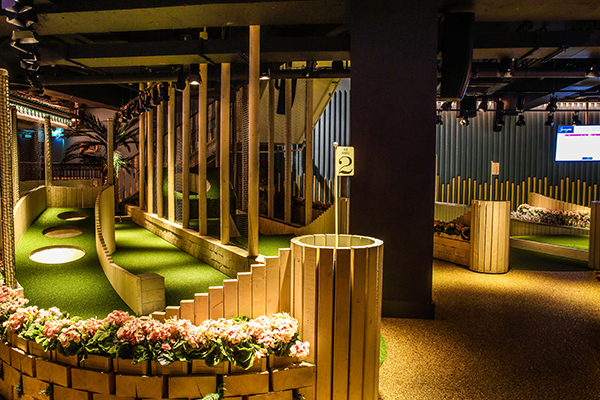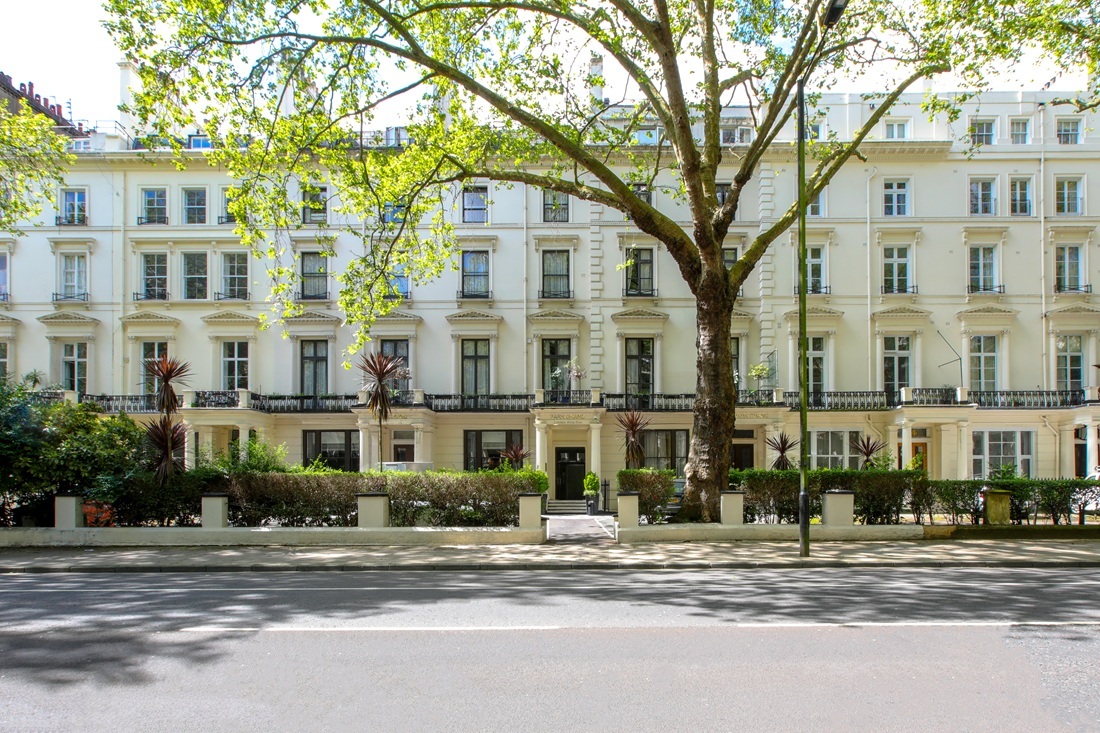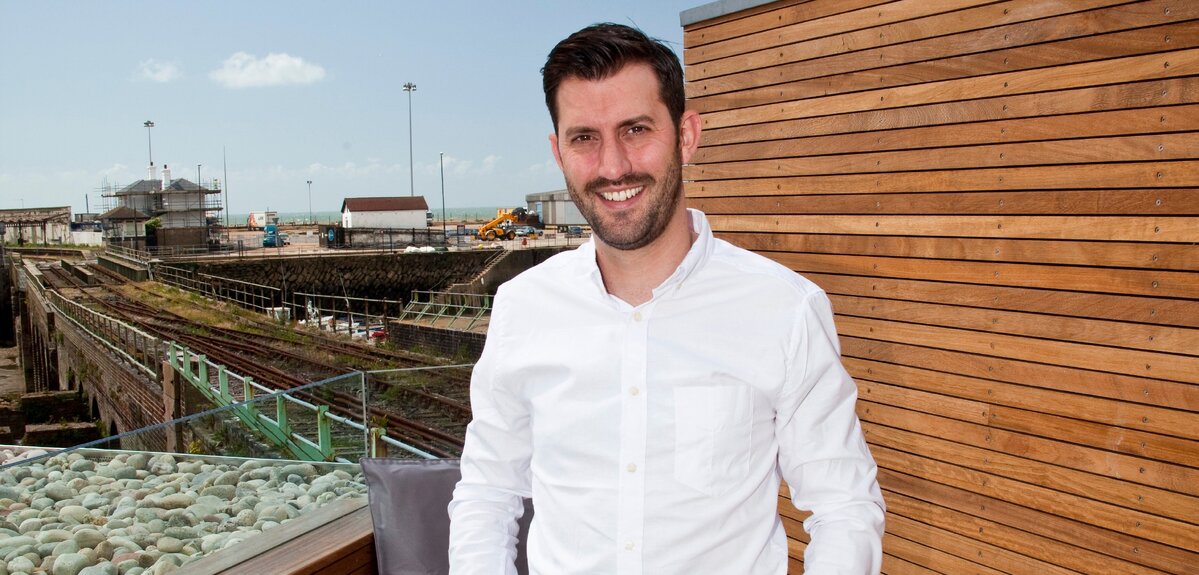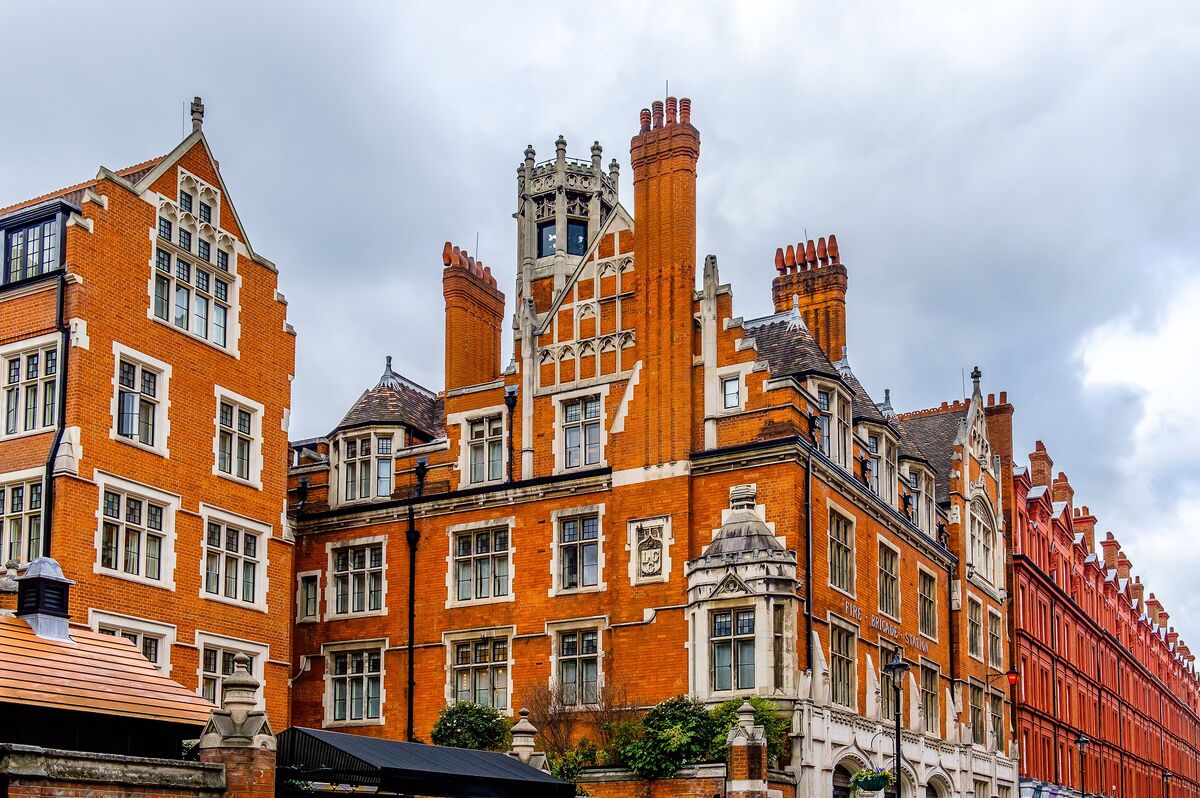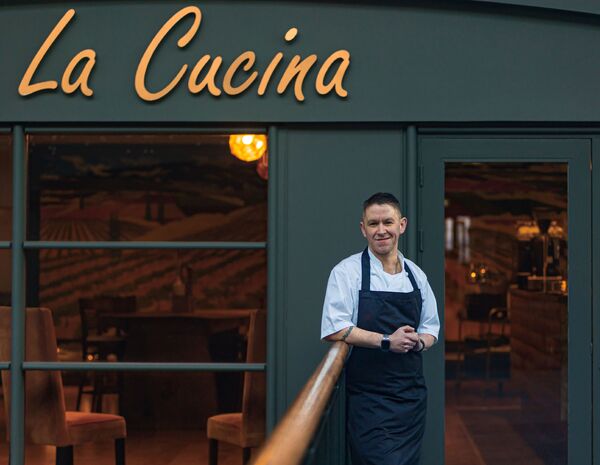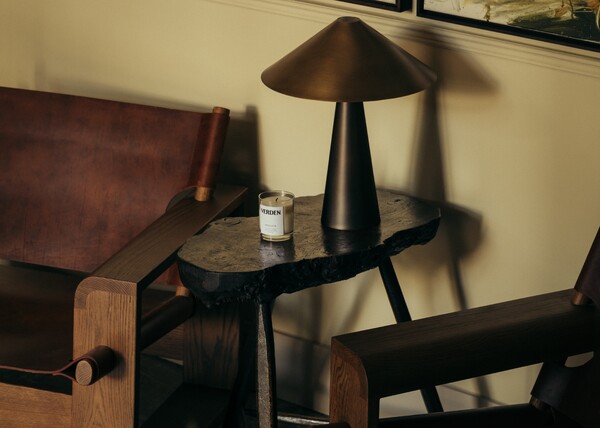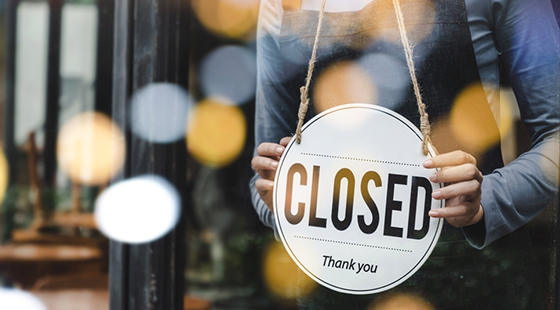A whole new ball game: Swingers co-founders Jeremy Simmonds and Matt Grech-Smith explain why the future of hospitality is all about competitive socialising
When crazy-golf-cum-street-food concept Swingers opened as a pop-up in 2014, few thought that within four years it would not only become a powerful future force in hospitality, but stand on the brink of cracking America. Tom Vaughan meets co-founders Jeremy Simmonds and Matt Grech-Smith
Jeremy Simmonds and Matt Grech-Smith are surveying their 18-hole golf course off London's Oxford Street. Vivid green, it snakes through tunnels and over undulating hills. In the distance, someone hoovers the helter skelter and the first batch of pizza dough arrives by hole six. From a course-side bar stool, Simmonds is in bullish mood: "If you speak to our ops director, he will wax lyrical about how this is the future of hospitality. I'm not saying that, but… it is not enough now just to serve some food and some drink and have a fairly nice environment. People do just want more from their night out."
Four years ago, the duo had a simple idea for a business model: "Come and play crazy golf with us in this warehouse in East London. We'll bring you cocktails while you play, and you can have a really great burger afterwards," explains Grech-Smith. Fast-forward four years and Swingers, as it is now known, boasts two permanent sites (in London's Shoreditch and the West End), each of which welcomes 5,000-7,000 customers through its doors each week and turns over £9m a year.
Meanwhile, the duo stand on the vanguard of one of the industry's breakout sectors: experiential hospitality. Or, as Simmonds and Grech Smith like to call it: "Competitive socialising". All of this has led the duo being named among The Sunday Times Maserati 100 Game-Changing Entrepreneurs and The Telegraph LDC Most Ambitious Business Leaders. If that all seems like quite an achievement for two 30-something-year-olds with minimal prior hospitality experience, then they aren't stopping there. Next on the horizon: cracking the US.
To see where it all began, we need to rewind to 2014. The duo had not long sold their youth events company, which they founded as students in 2003, and were wondering what their next move would be. "We were keen to stay in business together, and then this idea [Swingers] arose," says Simmonds. "To start with, it was just going to be a hobby; it was an interesting idea because it melded together the role of experiential leisure with bars and restaurants. We were seeing the success of things like All Star Lanes and Bounce at the time. But we thought that we could do it in a much more immersive and theatrical way."
They decided to test the water with a pop-up in London's Shoreditch, putting in £250,000 of their own money and raising a further £250,000 worth of alcohol brand sponsorship through their events-industry contact list. With so much of their own money at stake, there was a lot to lose: "It gave us a bit of fear," reflects Grech-Smith. "It gets you out of bed in the morning. You're the first one in, last one out, making sure the product is exactly what you want it to be."
What they never expected was just how "mental" it would go. After initial demand crashed their website, by the end of its run, the pop-up had expanded from three to five months in total, and three to seven days a week trading, and was taking roughly £80,000 a week. With hundreds of thousands of pounds' profit ready to roll over, the pair didn't need any more convincing and the banks were now only too willing to lend them the rest.
Location, location, location

In a move that Simmonds describes as the "beauty of naivety", the pair, "took a complete flyer on it". Grech-Smith continues: "We basically knew that if we didn't take the lease there and then, there was a very high risk that we weren't going to find another site for a year or two and, when we did, there might be massive competition for it. I'd like to say that it was fairly calculated, but there was a chance we might not have got planning permission."
It was just one of many knife-edge moments for the young company, says Simmonds: "We've been incredibly fortunate in that so many times on this journey things could have gone wrong and by hard work, a good strategy, finding the right people, but also, a massive chunk of luck, things have just fallen into place."
Just like the City site, Swingers West End has become hugely popular since opening in March 2018, welcoming around 6,000 customers a week. What has been the key to the businessâs roaring success? âWeâve learned certain things through business that are principals: fundamentally, understand what you know and what you donât know, and then surround yourself with the absolute best people in the areas where youâre deficient,â says Simmonds.
Take the food and beverage side of Swingers. Both venues host outlets of former streetfood operators Pizza Pilgrims, Patty & Bun or Breddos Tacos. âWhen you go into these types of venues previously, the food was always a compromise,â says Simmonds. âWeâre massive foodies, but we understood that weâre not restaurateurs. Therefore, it made perfect sense to go and get the very best brands out there.â
While the idea was very simple in principle, having three chains under one roof brought its own unique challenges, especially when it came to health and safety and sharing a communal kitchen. To solve such problems, the pair made sure they surrounded themselves with industry experience. Graham Hall, director of operations at Drake & Morgan, was an early investor and a vital sounding board, while the business has recently hired former vice-president of Brooklyn Bowl Adrees Ali as its operations director.
The American dream
Ali, who Simmonds describes as like âsigning a star strikerâ, was also brought in with a view to Swingersâ next move â" cracking the US. The pair aim to open a Swingers in Manhattan at some point next year. Itâs a particularly ambitious move for the duo, is it not? âWe go into it with full humility,â says Grech-Smith. âWe know that countless people have gone and been successful, but there have been probably twice as many who have gone and it hasnât worked. Weâd like to think that weâre mitigating the risks as much as possible. A great location, an ops director who is a veteran of the city… Weâre doing our groundwork; not rushing into it.â
Why America so soon? âThe New York experiential market is definitely behind where London is because the rents are higher out there. Itâs harder for people to trial these ideas and get them open. It is a marketplace crying out for these sorts of things,â says Grech-Smith.
Swingersâ planned move to the US will be bolstered by teaming up with private investment firm Cain International, which has a portfolio that already includes US health and wellness business St James; Mortimer House, a membersâ club, co-working space and restaurant in Fitzrovia, London; and AllBright, a group of womenâs membersâ clubs in London and Los Angeles. As well as extensive property knowledge â" a facet Simmonds and Grech-Smith have already identified as crucial to their expansion â" Cain International has invested £28m to help Swingers expand into the US and open a second competitive socialising concept in the UK.
For the duo, the investment stretches beyond the practical ramifications and sends out a message: âCompetitive socialising is an emerging sector of the market that has tended to be dismissed by some as a flash in the pan. But we want to show that this is a stable business model with huge potential. Bringing in these investors has helped us validate that belief.â
With the latest round of investment complete, do the pair have an idea of where Competitive Socialising â" also, aptly, the name of their parent company â" will be in 10 yearsâ time? âWe view business as one step leads to the next step,â says Simmonds. âIf you set out with a very concrete plan, you become blinkered to the opportunities that are in front of you right now and youâre going to end up in a different place. Itâs very clear what the next 24 months could look like to us, and we will go after that with full focus, and that will unlock the next 24 months.â
The advantage of the Swingers business model is that the pair donât have to scale quickly, and can keep a small number of highly profitable venues. âWeâre lucky, because I think a lot of hospitality businesses, their roll-outs are about doing 10, 20, 30 sites. As a founder, you canât help but lose touch with whatâs happening at site level,â explains Grech-Smith. âWeâre a slightly different model. Swingers is a big beast and, if you get it right, it can be incredibly cash-generative. So our model isnât necessarily about doing 30 of these. I mean, maybe one day there will be 30 of them, and that would be very nice, but we can do four or five or six of these and have a really big business.â
Whatever the future holds, the pair remain adamant that experiential hospitality â" or competitive socialising, call it what you will â" will dominate the industry in the years to come. âItâs an area of hospitality thatâs here to stay,â says Simmonds. âWe just need to educate consumers. Although, to be honest, that sounds a bit patronising. Consumers already want this and the demand speaks for itself. Together, weâre just making the sector stronger and stronger.â
Swingers: facts and figures
Swingers City Address 8 Brownâs Buildings, Shoreditch, London
Opened April 2015
Size 18,000 sq ft
Customers 5,000-7,000 a week
Annual turnover £9m
Average spend for group bookings £55 per person
Average spend for individual bookings £30 per person
Swingers West End Address 15 John Princeâs Street, Marylebone, London
Opened March 2018
Size 21,000 sq ft
Customers 5,000-7,000 a week
Annual turnover £9m
Average spend for group bookings £55 per person
Average spend for individual bookings £30 per person
Experiential hospitality: flash in the pan or the future?
In the last year alone, the British public has spent 6% less on shoes and 8% more on restaurants. It is, reports Barclaycard â" the company behind the research â" just part of a wider consumer trend to spend money on experiences, rather than things. Is this a bout of pre-Brexit hedonism or something to sit up and take note of?
For Kate Nightingale, consumer psychologist and founder of customer experience consultancy Style Psychology, the answer is unequivocal: âThe majority of Western cultures are moving away from materialism to experientialism. As material possessions reach their natural threshold where they stop delivering happiness, people divert to experiences as something more meaningful.â
The stats back it up, and 2017 research by Eventbrite found that 75% of millennials value experiences over things. James Wallman, author of Stuffocation: Living More With Less, thinks this is just the start: âWe are on the cusp of one of the great sociocultural shifts of the 21st century. The world is changing from materialism to experientialism.â
Part of this is due to the relative wealth now circulating in the first world, and the ease with which we can buy what we want. But another part of it is the mammalian urge towards status.
âSince consumerism kicked off in the start of the 20th century, the easiest way to show status has been through what we wear,â he explains. However, in a digital world, this is all changing. âYou canât show off your record collection because we have Spotify, or our big library because we have Kindles. But we are all connected on social media â" we can show off our amazing holiday or how much fun we had at Swingers or that we completed Tough Mudder. Ownership of stuff isnât that impressive any more â" experiences are.â
The most successful businesses, says Daniel Mathieson, head of sponsorship at Barclaycard, are the ones that are tapping into this: âTo create longlasting relationships, brands need to offer more than the best product or service â" they need to tap into consumersâ hearts and minds, too.â
The need for brands to offer consumers âsomething extraâ is especially pertinent for the hospitality sector â" 68% of Barclaycard respondents said the setting they are served in is as important as the food or beverage itself. Some in the industry are already reacting to this consumer desire. As well as Swingersâ success, London Union, the parent company of Street Feast, saw revenue grow by 40% to £12.8m in 2017; meanwhile former property investor Andy Lewis-Pratt and Simon Anderson, the restaurateur behind Pitt Cue Co, plan to open their third Market Halls food concept in London in spring 2019. âThe experiential economy isnât going anywhere,â says Wallman. âItâs one of the fundamental changes to our society and this is just the start.â
Meet the experts: The Caterer Summit >>
Crazy golf brand Swingers secures investment for new concept >>



